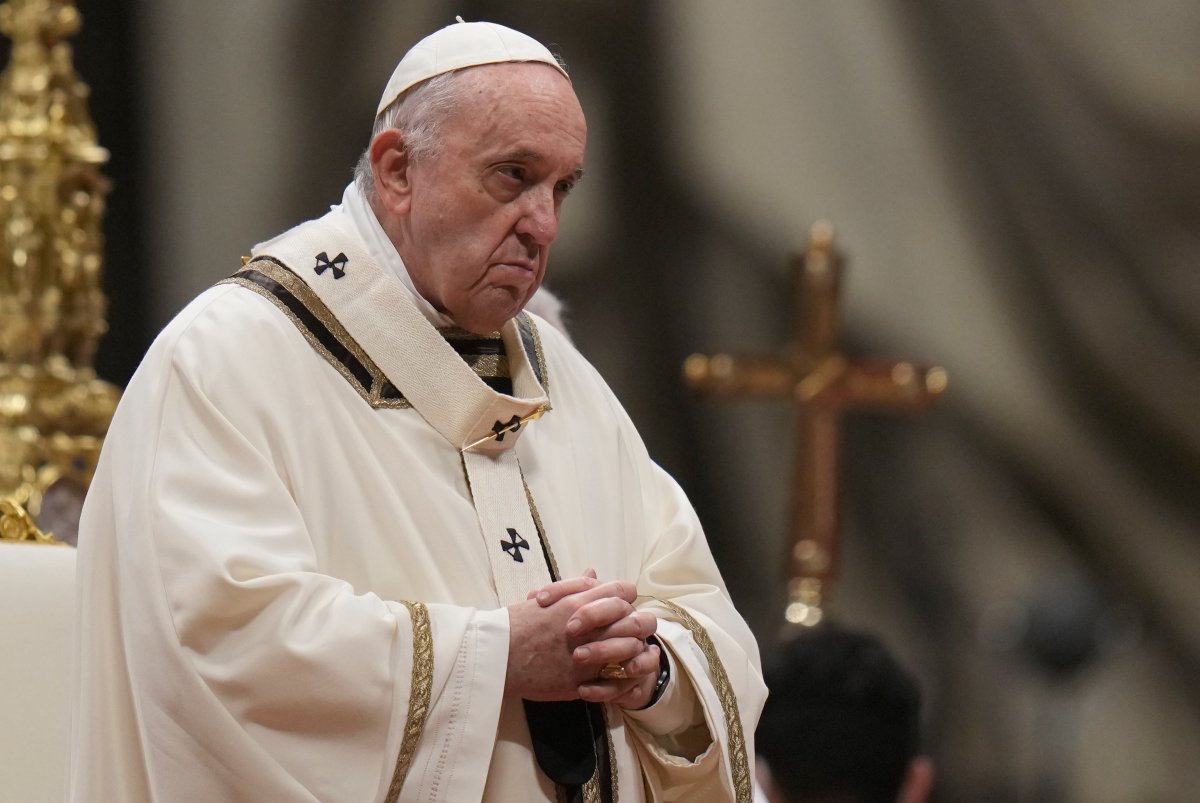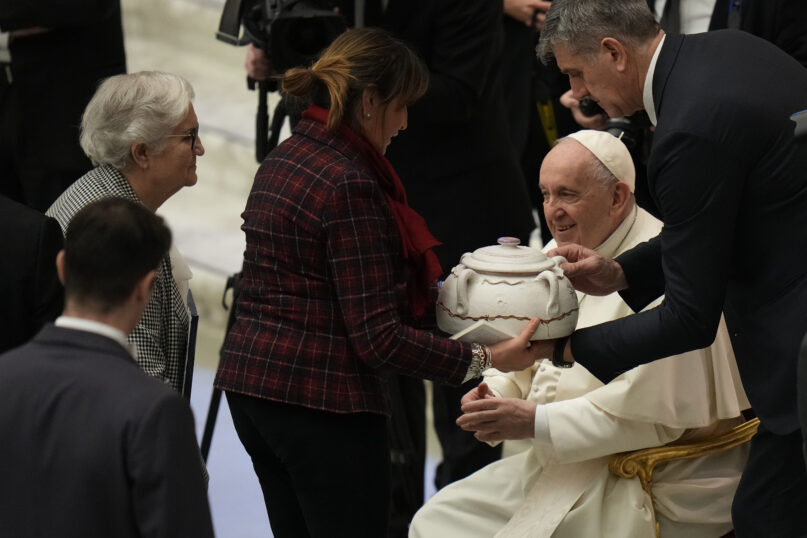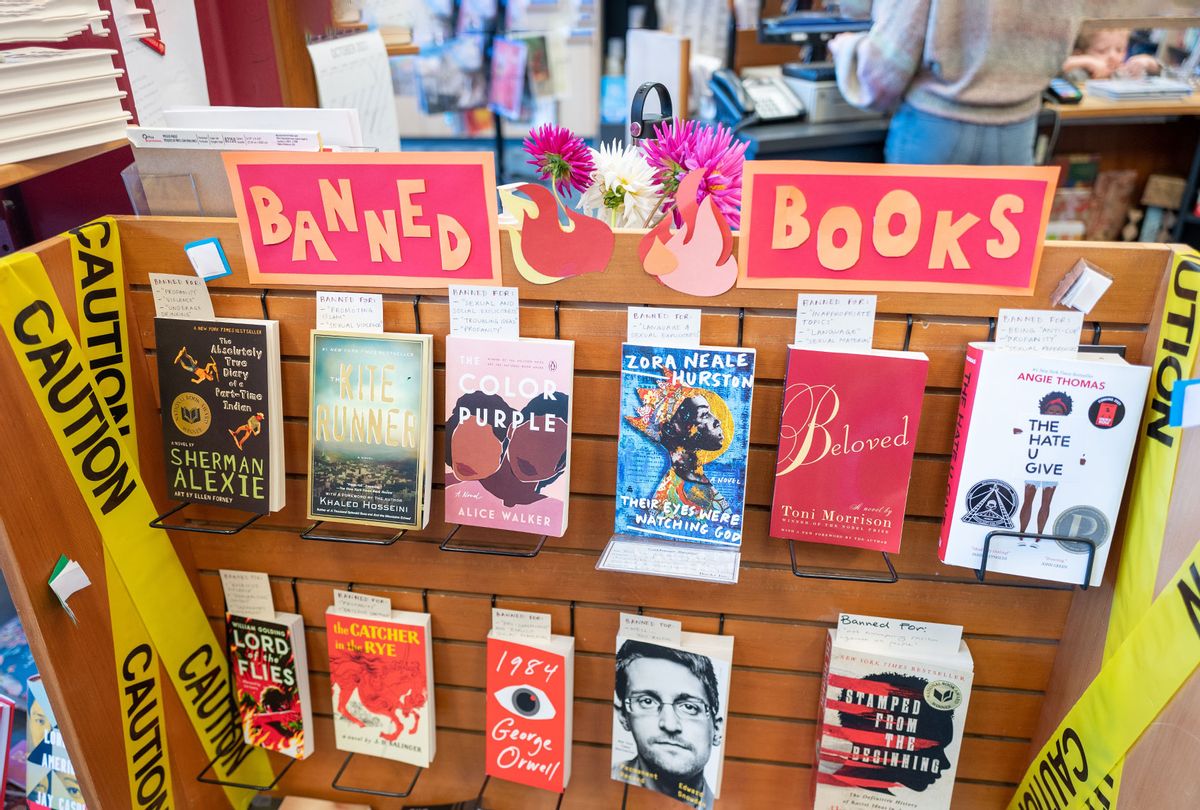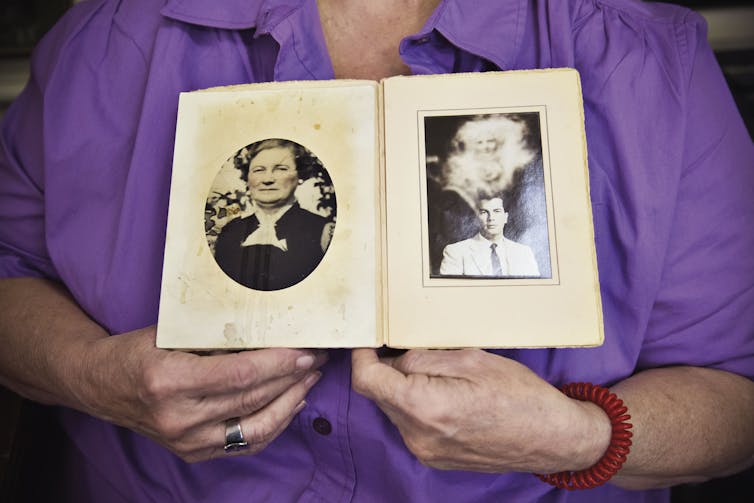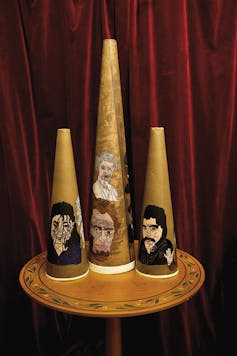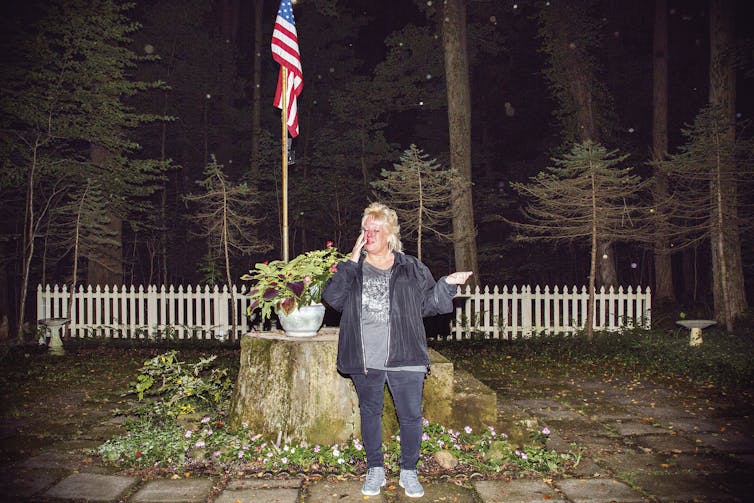BY KATHERINE FUNG ON 1/26/22
Amid Florida's debate over the discussion of LGBT-related topics and teaching materials in schools, one lawmaker called out remarks from a parental rights advocate for claiming that books in school libraries are convincing children to become gay or transgender.
"As a gay man, to sit here in committee, to hear that—There was no book that I read that brought me to who I am," state Senator Shevirn Jones said during Tuesday's education committee hearing. "And even your children—I don't care what you may try to do to think that you are protecting them...the one thing you are obligated to do, like my father and mother did, is to love them for who they are.
Jones' remarks came in response to the claims of several parents at the hearing, like Karen Moran, who was with a group called BEST SOS America.
On Tuesday, Moran read from a book titled It Feels Good to Be Yourself: A Book About Gender Identity, which she claimed there are 112 copies of at Palm Beach County Libraries. Newsweek's search on the library system turned up no results.
"It's causing gender confusion with our kids and it should not be in our libraries and we should not be funding this and we should get all these books out," Moran told the committee, of which Jones is the vice-chair.
"This bill is a great method to get these books out and make people aware of what's going on," she said about Senate Bill 1300, which the hearing centered on.
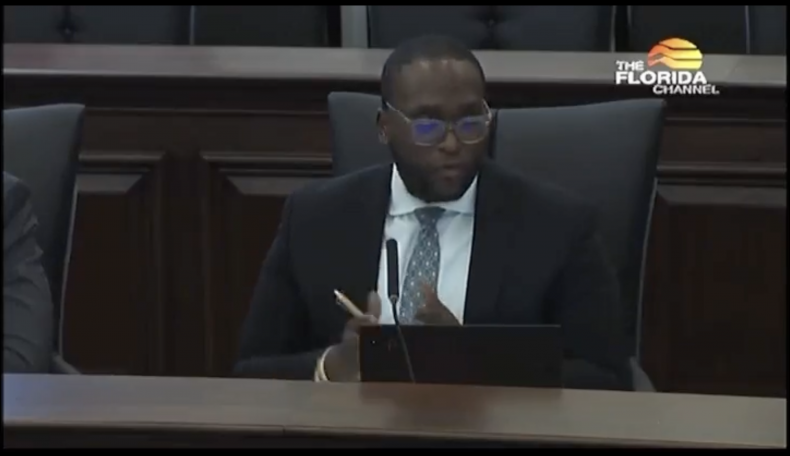
Amid Florida's debate over the discussion of LGBT-related topics and teaching materials in schools, one lawmaker called out remarks from a parental rights advocate for claiming that books in school libraries are convincing children to become gay or transgender.
"As a gay man, to sit here in committee, to hear that—There was no book that I read that brought me to who I am," state Senator Shevirn Jones said during Tuesday's education committee hearing. "And even your children—I don't care what you may try to do to think that you are protecting them...the one thing you are obligated to do, like my father and mother did, is to love them for who they are.
Jones' remarks came in response to the claims of several parents at the hearing, like Karen Moran, who was with a group called BEST SOS America.
On Tuesday, Moran read from a book titled It Feels Good to Be Yourself: A Book About Gender Identity, which she claimed there are 112 copies of at Palm Beach County Libraries. Newsweek's search on the library system turned up no results.
"It's causing gender confusion with our kids and it should not be in our libraries and we should not be funding this and we should get all these books out," Moran told the committee, of which Jones is the vice-chair.
"This bill is a great method to get these books out and make people aware of what's going on," she said about Senate Bill 1300, which the hearing centered on.

"The one thing you are obligated to do, like my father and mother did, is to love them for who they are," Jones told parents at the January 25, 2022 hearing (seen above).
THE FLORIDA SENATE
While the bill would mandate a review process of teaching materials, it is aimed at capping the salaries of local school board members so that those figures don't exceed what state lawmakers make.
Addressing the room, Jones, who is the first openly gay Black person elected to the state legislature, said he did not want to wade into the politics of the issue but simply wanted to remind those at the hearing to "lead and speak with love."
"I'm not going to speak about the politics of this because all of that is going to go out the window eventually," he said. "My ask is that, as you all speak, just realize there are individuals who hear you and might be in the shoe of someone that your words are hurtful towards."
"It's not me because I'll be fine," he added. "I'm a grown man and can take care of myself and my colleagues love me and such but I want to just put it out there to you all that as you go and you advocate—please do advocate for your children, I support that—but be careful in how you advocate to make sure you're not harming anyone."
While the bill would mandate a review process of teaching materials, it is aimed at capping the salaries of local school board members so that those figures don't exceed what state lawmakers make.
Addressing the room, Jones, who is the first openly gay Black person elected to the state legislature, said he did not want to wade into the politics of the issue but simply wanted to remind those at the hearing to "lead and speak with love."
"I'm not going to speak about the politics of this because all of that is going to go out the window eventually," he said. "My ask is that, as you all speak, just realize there are individuals who hear you and might be in the shoe of someone that your words are hurtful towards."
"It's not me because I'll be fine," he added. "I'm a grown man and can take care of myself and my colleagues love me and such but I want to just put it out there to you all that as you go and you advocate—please do advocate for your children, I support that—but be careful in how you advocate to make sure you're not harming anyone."
Although Jones stopped short of instructing parents to move their kids out of public schools as a solution to their unhappiness with the books available in their districts, some of his colleagues, like Democratic state Senator Tina Polsky, did not hold back.
"You have a choice. If you don't like what you see in the schools... then don't go. Then homeschool your kid," she said at the hearing. "If you want them insulated so much that they shouldn't learn about the outside world, you can homeschool or you can send them to a religious private school with voucher money. We have made that immensely available."
Relative to other states, Florida has a wide range of school choice programs, including vouchers, tax-credit scholarships and education savings accounts for students to use at a private school in the state.
At the end of the hearing, SB 1300 advanced on a party-line vote
READ MORE
Chasten Buttigieg Says Florida 'Don't Say Gay' Bill Not for Parental Rights
Bill Could Block Kids With LGBTQ Parents From Class Discussions, Some Fear
Appeals Court Says Teacher Fired for Same-Sex Marriage Can Continue Lawsuit
Indiana School District Sued Over Transgender Restroom Access
Chasten Buttigieg Says Florida 'Don't Say Gay' Bill Not for Parental Rights
Bill Could Block Kids With LGBTQ Parents From Class Discussions, Some Fear
Appeals Court Says Teacher Fired for Same-Sex Marriage Can Continue Lawsuit
Indiana School District Sued Over Transgender Restroom Access
GOP bill in Arizona would force teachers to out LGBTQ students to parents
Arizona Mirror
January 27, 2022

LGBT rights demonstrators (Shutterstock.com)
Arizona Republicans this week lined up behind a measure that would discipline teachers and open them up to lawsuits if they don’t tell parents everything a student tells them — even if the student confides that he or she is gay or transgender.
The legislation, House Bill 2161, would make it illegal for a government employee to withhold information that is “relevant to the physical, emotional or mental health of the parent’s child,” and specifically prevents teachers from withholding information about a student’s “purported gender identity” or a request to transition to a gender other than the “student’s biological sex.”
The bill would allow parents to sue school districts if teachers don’t comply.
Rep. Steve Kaiser, R-Phoenix, the bill’s sponsor, argued in the House Education Committee on Jan. 25 that the aim of the legislation is to reign in surveys sent out by schools that have made headlines in a number of states and locally. The bill also aims to allow parents additional access to certain medical records.
“I still feel this bill is not ready for prime time,” Rep. Daniel Hernandez, D-Tucson, said, adding that he felt there was some merit to schools surveying students. “This bill could’ve been done without this inclusion or without the trivialization of transgender children.”
Far-right groups
Kaiser initially said the bill was created via a “stakeholder group” and his “own inherent passion” for the issue. But when Hernandez pressed him on which stakeholders were involved in drafting the bill, Kaiser admitted he didn’t work with education groups or teachers, but with anti-LGBTQ advocacy groups — chief among them the Center for Arizona Policy, a conservative Christian lobbying organization that has pushed numerous controversial and bigoted bills since forming in 1995. CAP holds sway with most Republican lawmakers and Gov. Doug Ducey, and is widely considered one of the most powerful lobbying groups at the state Capitol.
“I know you have a long-standing (dislike) of that organization. I understand where the bait was in that question,” Kaiser told Hernandez, who is gay. “I’m not sure what education group I’d go to, because they’d be against this.”
Another stakeholder that Kaiser consulted is Family Watch International, which the Southern Poverty Law Center has designated an anti-LGBTQ hate group. That group also has its fingerprints on another piece of legislation that would ban any books that have “sexually explicit” content and that critics say would effectively make it illegal to teach about homosexuality.
Supporters of the bill said it was necessary to punish teachers in order to bring transparency to schools, who they said have been asking “inappropriate questions.” Some said the $500 fine for school districts in the bill’s language was not large enough, a thought echoed by Rep. John Fillmore, R-Apache Junction, who said that was a “drop in the bucket” for a school district and asked Kaiser if he’d agree to increase the amount.
Jeanne Casteen, the executive director of the Arizona Secular Coalition and a former teacher, worried about how the reporting function of the bill would impact child abuse. Teachers are mandatory reporters, and Casteen said that every time she had to report child abuse, it was being inflicted by a parent. Under Kaiser’s bill, she said, a teacher would also have to notify the parents — the likely abusers — that the child informed them of the abuse.
“I keep hearing about parental rights, but what about the rights of these students?” Casteen said.
One of the speakers for the other side was Nicole Eidson with a parent group called “Moms for Liberty” known for frequenting Chandler Unified School District meetings and complaining about alleged racism education and training.
“I’ve been hearing a lot about that kids have rights, but in my household, I gotta say, it is a dictatorship,” Eidson said, adding that schools have “no right” to put forward what is “right” for her to do in her household.
Although the bill cleared the committee along party-lines with Republican support, Rep. Joel John, R-Arlington, acknowledged there may be situations where a student may be more comfortable confiding with their teacher than with a parent.
John said that Kaiser will need to seek changes to the bill, specifically the issues relating to outing students, if he wants his continued support.
Arizona Mirror is part of States Newsroom, a network of news bureaus supported by grants and a coalition of donors as a 501c(3) public charity. Arizona Mirror maintains editorial independence. Contact Editor Jim Small for questions: info@azmirror.com. Follow Arizona Mirror on Facebook and Twitter.
January 27, 2022

LGBT rights demonstrators (Shutterstock.com)
Arizona Republicans this week lined up behind a measure that would discipline teachers and open them up to lawsuits if they don’t tell parents everything a student tells them — even if the student confides that he or she is gay or transgender.
The legislation, House Bill 2161, would make it illegal for a government employee to withhold information that is “relevant to the physical, emotional or mental health of the parent’s child,” and specifically prevents teachers from withholding information about a student’s “purported gender identity” or a request to transition to a gender other than the “student’s biological sex.”
The bill would allow parents to sue school districts if teachers don’t comply.
Rep. Steve Kaiser, R-Phoenix, the bill’s sponsor, argued in the House Education Committee on Jan. 25 that the aim of the legislation is to reign in surveys sent out by schools that have made headlines in a number of states and locally. The bill also aims to allow parents additional access to certain medical records.
“I still feel this bill is not ready for prime time,” Rep. Daniel Hernandez, D-Tucson, said, adding that he felt there was some merit to schools surveying students. “This bill could’ve been done without this inclusion or without the trivialization of transgender children.”
Far-right groups
Kaiser initially said the bill was created via a “stakeholder group” and his “own inherent passion” for the issue. But when Hernandez pressed him on which stakeholders were involved in drafting the bill, Kaiser admitted he didn’t work with education groups or teachers, but with anti-LGBTQ advocacy groups — chief among them the Center for Arizona Policy, a conservative Christian lobbying organization that has pushed numerous controversial and bigoted bills since forming in 1995. CAP holds sway with most Republican lawmakers and Gov. Doug Ducey, and is widely considered one of the most powerful lobbying groups at the state Capitol.
“I know you have a long-standing (dislike) of that organization. I understand where the bait was in that question,” Kaiser told Hernandez, who is gay. “I’m not sure what education group I’d go to, because they’d be against this.”
Another stakeholder that Kaiser consulted is Family Watch International, which the Southern Poverty Law Center has designated an anti-LGBTQ hate group. That group also has its fingerprints on another piece of legislation that would ban any books that have “sexually explicit” content and that critics say would effectively make it illegal to teach about homosexuality.
Supporters of the bill said it was necessary to punish teachers in order to bring transparency to schools, who they said have been asking “inappropriate questions.” Some said the $500 fine for school districts in the bill’s language was not large enough, a thought echoed by Rep. John Fillmore, R-Apache Junction, who said that was a “drop in the bucket” for a school district and asked Kaiser if he’d agree to increase the amount.
Jeanne Casteen, the executive director of the Arizona Secular Coalition and a former teacher, worried about how the reporting function of the bill would impact child abuse. Teachers are mandatory reporters, and Casteen said that every time she had to report child abuse, it was being inflicted by a parent. Under Kaiser’s bill, she said, a teacher would also have to notify the parents — the likely abusers — that the child informed them of the abuse.
“I keep hearing about parental rights, but what about the rights of these students?” Casteen said.
One of the speakers for the other side was Nicole Eidson with a parent group called “Moms for Liberty” known for frequenting Chandler Unified School District meetings and complaining about alleged racism education and training.
“I’ve been hearing a lot about that kids have rights, but in my household, I gotta say, it is a dictatorship,” Eidson said, adding that schools have “no right” to put forward what is “right” for her to do in her household.
Although the bill cleared the committee along party-lines with Republican support, Rep. Joel John, R-Arlington, acknowledged there may be situations where a student may be more comfortable confiding with their teacher than with a parent.
John said that Kaiser will need to seek changes to the bill, specifically the issues relating to outing students, if he wants his continued support.
Arizona Mirror is part of States Newsroom, a network of news bureaus supported by grants and a coalition of donors as a 501c(3) public charity. Arizona Mirror maintains editorial independence. Contact Editor Jim Small for questions: info@azmirror.com. Follow Arizona Mirror on Facebook and Twitter.
GOP mayor holds library funds hostage until “homosexual” books are taken off shelves
The mayor says homosexuality is against his religion. But the town's librarian is standing up to him.
The mayor says homosexuality is against his religion. But the town's librarian is standing up to him.
By Molly Sprayregen Wednesday, January 26, 2022
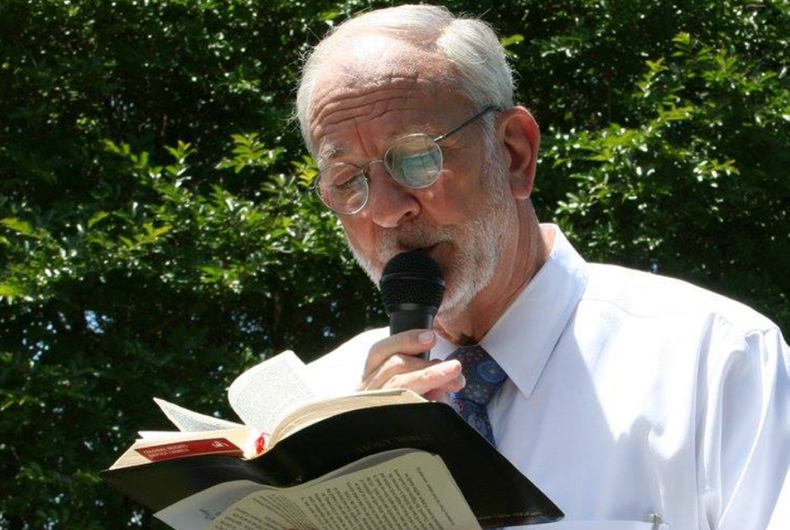
Mayor Gene McGee Photo: Campaign website
The mayor of a small Mississippi city is withholding $110,000 from the county’s library system until it removes all LGBTQ books.
Tonja Johnson, the executive director of the Madison County Library System, was confused when the library didn’t receive its first 2022 quarterly payment from the city of Ridgeland. She called Ridgeland Mayor Gene McGee (R), who told her the library would not be receiving the money until it removed all LGBTQ content from the shelves.
Related: Mother sues school claiming teachers made her kid change gender identity
“He explained his opposition to what he called ‘homosexual materials’ in the library, that it went against his Christian beliefs, and that he would not release the money as the long as the materials were there,” Johnson told the Mississippi Free Press.
Despite Johnson explaining to McGee that the library is not a religious institution and is there to serve the entire community, she said McGee emphasized that “he only serves the great Lord above.”
One book McGee specifically mentioned that he wants out is The Queer Bible, a book of essays about LGBTQ history and culture.
Johnson believes McGee’s outburst could be a reaction to a few informal complaints the library has received about LGBTQ content.
“I think that’s probably where the mayor’s objections are coming from. Perhaps they reached out to him instead of back out to the library.”
The $110,000 McGee is withholding is about 5% of the library system’s annual budget. Losing it, Johnson said, “would definitely impact services” and could even result in some staff members getting laid off.
McGee also made it clear that he alone made the decision to withhold the funds, without the approval of the city’s board of aldermen, who had already approved the 2022 budget. The library board has decided to speak with the board of alderman before pursuing any legal action.
No matter the outcome, Johnson said she doesn’t anticipate the library bending to McGee’s demands.
“Ultimately it is up to the [library] Board, but I do not think they will make that decision,” Johnson said. “As a library, our mission is to serve our community and to provide everyone in the community with the information and resources that they need…Anyone can walk into a library and find something that they don’t agree with, but the book that’s not quite right for you is exactly what someone else needs. And my job is to make sure that [everybody] has access to that.”
Kit Williamson, who grew up in Mississippi and went to school in Ridgeland, told LGBTQ Nation that as a young person trying to become comfortable with himself, LGBTQ representation in stories meant the world to him.
“Representation is a powerful, life-saving force and seeing myself reflected in stories growing up helped me envision a future free from the shame and fear that was consuming me as a kid,” Williamson said. “Far from an isolated incident, actions like this attempted book ban are part of a concerted effort to erase LGBTQ people from the public eye, but we’re here to stay and we will not go backwards.”
He added that McGee “needs to go to the Ridgeland library and read up on the constitution” and that “Mississippi is not a theocracy, and this is a clear violation of the 1st amendment.”
Johnson also emphasized that LGBTQ books are not only there for LGBTQ people, but also to help everyone gain more understanding and empathy for one another.
“We all live in this world together,” she said. “We sit next to people in church, we work with people, we live next door to people, our children go to school with children who don’t look like us and don’t have the same experiences. If we’re going to be together, we have to at least understand each other’s stories.”
Calls to ban books with LGBTQ content, as well as content about race and gender, are taking place across the country as part of a conservative crusade. Conservatives argue that parents have a right to prevent their children from learning about racism and LGBTQ people.

Mayor Gene McGee Photo: Campaign website
The mayor of a small Mississippi city is withholding $110,000 from the county’s library system until it removes all LGBTQ books.
Tonja Johnson, the executive director of the Madison County Library System, was confused when the library didn’t receive its first 2022 quarterly payment from the city of Ridgeland. She called Ridgeland Mayor Gene McGee (R), who told her the library would not be receiving the money until it removed all LGBTQ content from the shelves.
Related: Mother sues school claiming teachers made her kid change gender identity
“He explained his opposition to what he called ‘homosexual materials’ in the library, that it went against his Christian beliefs, and that he would not release the money as the long as the materials were there,” Johnson told the Mississippi Free Press.
Despite Johnson explaining to McGee that the library is not a religious institution and is there to serve the entire community, she said McGee emphasized that “he only serves the great Lord above.”
One book McGee specifically mentioned that he wants out is The Queer Bible, a book of essays about LGBTQ history and culture.
Johnson believes McGee’s outburst could be a reaction to a few informal complaints the library has received about LGBTQ content.
“I think that’s probably where the mayor’s objections are coming from. Perhaps they reached out to him instead of back out to the library.”
The $110,000 McGee is withholding is about 5% of the library system’s annual budget. Losing it, Johnson said, “would definitely impact services” and could even result in some staff members getting laid off.
McGee also made it clear that he alone made the decision to withhold the funds, without the approval of the city’s board of aldermen, who had already approved the 2022 budget. The library board has decided to speak with the board of alderman before pursuing any legal action.
No matter the outcome, Johnson said she doesn’t anticipate the library bending to McGee’s demands.
“Ultimately it is up to the [library] Board, but I do not think they will make that decision,” Johnson said. “As a library, our mission is to serve our community and to provide everyone in the community with the information and resources that they need…Anyone can walk into a library and find something that they don’t agree with, but the book that’s not quite right for you is exactly what someone else needs. And my job is to make sure that [everybody] has access to that.”
Kit Williamson, who grew up in Mississippi and went to school in Ridgeland, told LGBTQ Nation that as a young person trying to become comfortable with himself, LGBTQ representation in stories meant the world to him.
“Representation is a powerful, life-saving force and seeing myself reflected in stories growing up helped me envision a future free from the shame and fear that was consuming me as a kid,” Williamson said. “Far from an isolated incident, actions like this attempted book ban are part of a concerted effort to erase LGBTQ people from the public eye, but we’re here to stay and we will not go backwards.”
He added that McGee “needs to go to the Ridgeland library and read up on the constitution” and that “Mississippi is not a theocracy, and this is a clear violation of the 1st amendment.”
Johnson also emphasized that LGBTQ books are not only there for LGBTQ people, but also to help everyone gain more understanding and empathy for one another.
“We all live in this world together,” she said. “We sit next to people in church, we work with people, we live next door to people, our children go to school with children who don’t look like us and don’t have the same experiences. If we’re going to be together, we have to at least understand each other’s stories.”
Calls to ban books with LGBTQ content, as well as content about race and gender, are taking place across the country as part of a conservative crusade. Conservatives argue that parents have a right to prevent their children from learning about racism and LGBTQ people.
